Comenzar por "estce que" y continuar con la misma fórmula que en las afirmativas, es decir sujeto verbo complemento Ej Estce que tu parles français?Estce que The phrase estce que (literally, "is it that") is the inversion of c'est que ("this is that") In reality, estce que has no meaning at all – it simply goes in front of a statement to turn it into a questionEstce que vous aimez le livre ?

Final Exam 10 December 15 Questions And Answers Studocu
Est-ce que examples
Est-ce que examples-Is she bringing the tickets?For example Vous aimez la France You like France Kindly note that in this sentence, the subject precedes the verb Aimezvous la France?



How Do I Report A Problem With A Sentence Or Translation Duolingo Help Center
Parce qu'elle déteste les extraterrestres Parce qu'elle voulait suivre (follow) Morgan Parce qu'elle ne sait pas piloter Parce que Morgan a tiré sur l'ambassadeur des extraterrestresPouvezvous parler plus lentement?Pourquoi est ce que tu as fait cela?
With a question wordWith a question wordCe Que Je Sais zum kleinen Preis In geprüften Shops bestellen Using the French question Qui estce qui (= Who is it that = Who ?), you can also ask Qui estce qui a appelé ?
Estce is actually the inversion of c'est ("it is") Like all inversions a '' dash is required These questions in this form are typically mean't to elicit a "Oui" or "Non" answer If you want more than that, you must precede it with an interrogative Quand estce que, Qui estce que, or Quel estce que, for example(= What is it?) But, in everyday spoken French, we would rather use C'est quoi?OR Are you not



Ball Colloquial French Grammar A Practical Guide Pdf Document



Les Questions Le Cours De Francais
Pourquoi estce que Sandy s'est sauvée?5 Estce que c'est bien d'être franc avec ses amis, à votre avis?A simple explanation of "Questions Qui / qui estce que = Whom ?" Revise and improve your French with detailed content, examples, audio, personalised practice tests and learning tools



Learn French Blog By Frenchpod101 Com
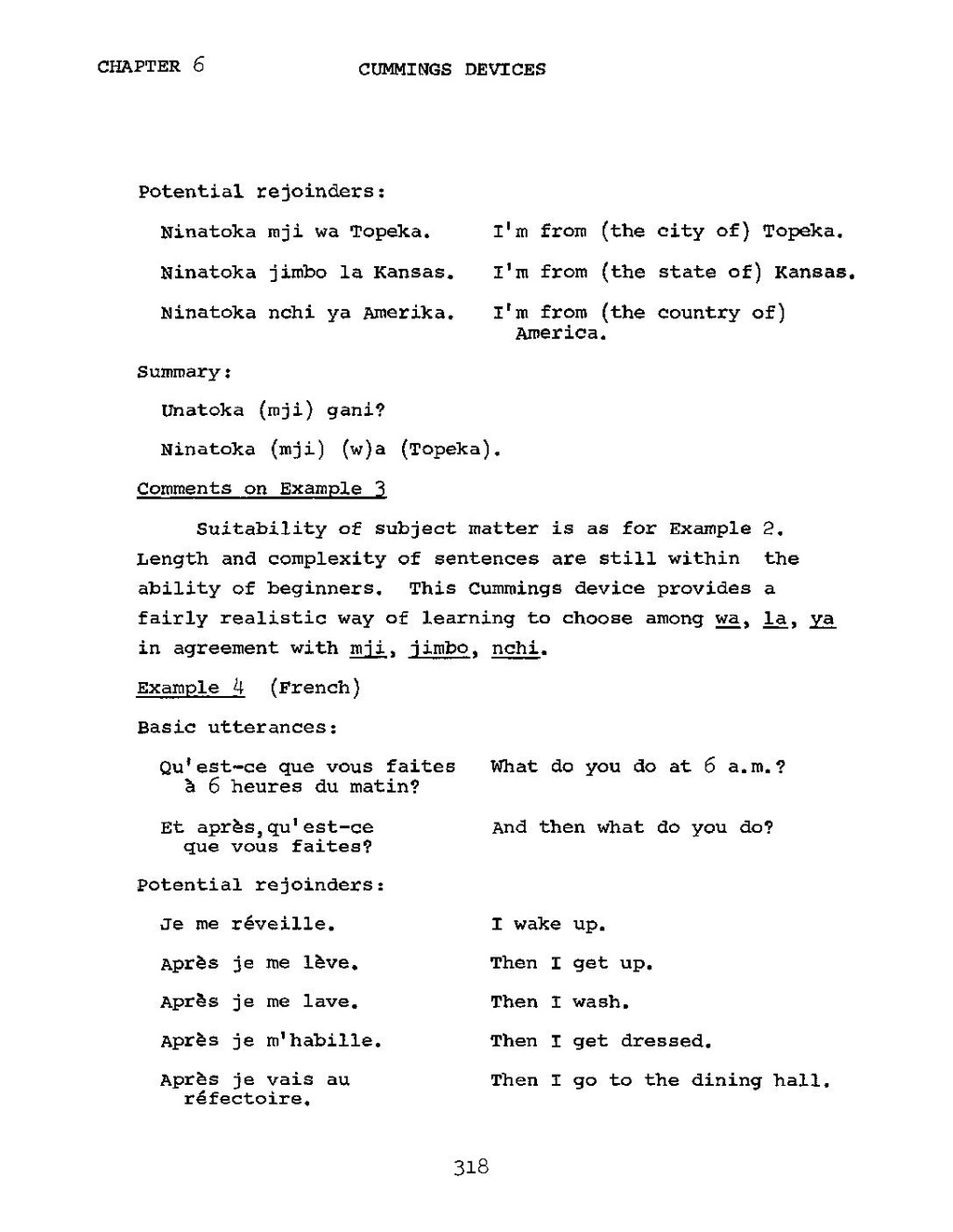


Page Adapting And Writing Language Lessons Pdf 335 Wikisource The Free Online Library
3 Estce que vous aimez les gens enthousiastes?Usage notes N'estce pas doesn't mean much;Estce que abbreviates to estce qu' before a vowel Estce qu'elle apport les billets ?


Proficiency Press Co French Health And Welfare Sample Page



Homework French 106
Questions are given using estce que to be switched to the same question, but using inversion instead Or inversion questions are switched to ones using estce que Terms in this set (16)Par example Vous préférez quel sport?When will you come?


Calico Journal Volume 9 Number Pdf Free Download
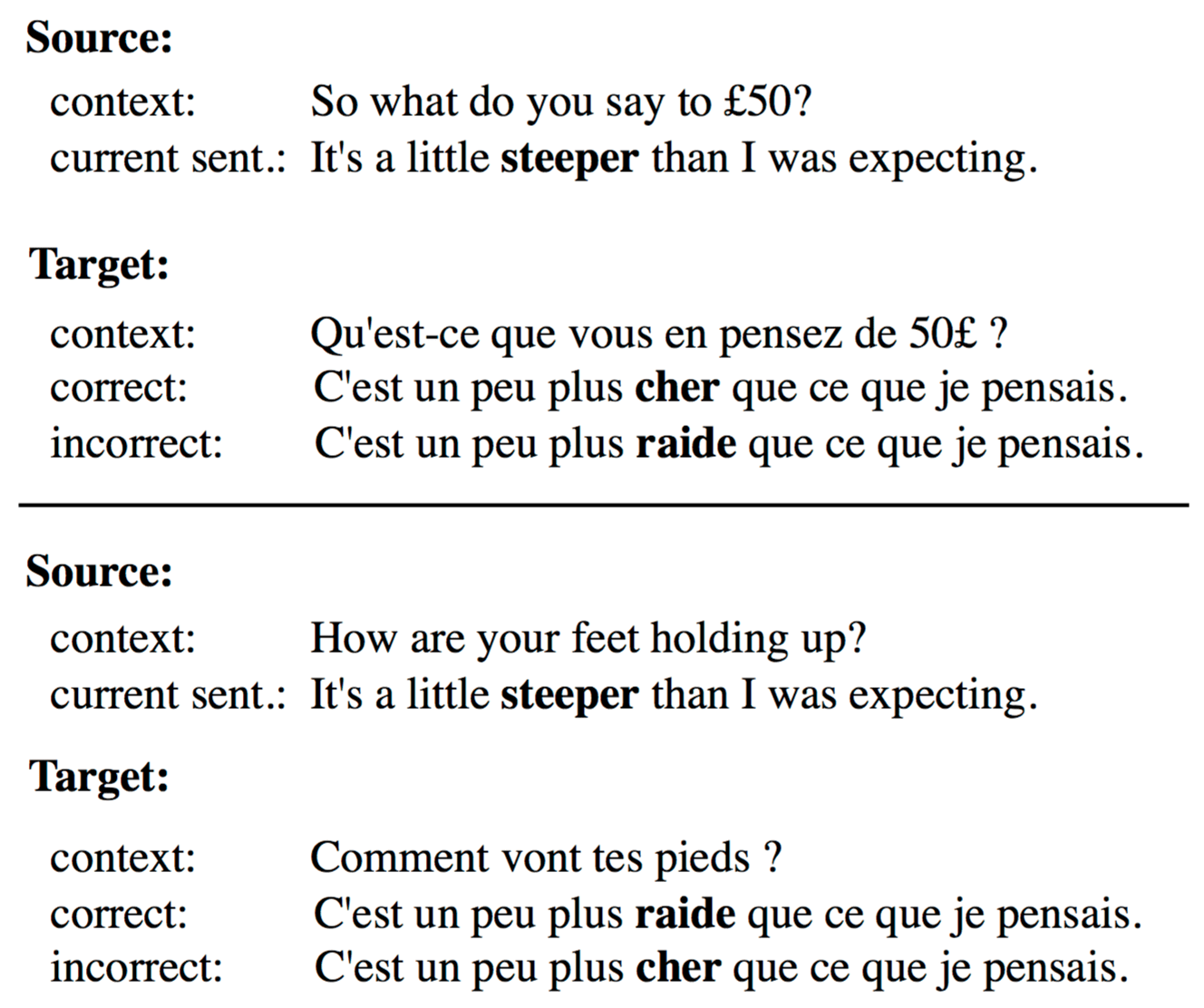


When A Good Translation Is Wrong In Context
This rule is illustrated in the examples Qu'estce qu'il and Estce qu'il and is general We have already mentioned the same kind of contraction with the pronoun je (I) je mange (I eat) and j'achète (I buy) when used with the conjunction qui (who), estce que is replaced by estce qui resulting in Qui estce qui This alteration is not a caprice of the French language but is conversely governed by strict grammatical rulesIt is just to add "Estce que" to the front of a statement With "Estce que" in front of it, any statement becomes a question Here again are the examples above, but this time instead of the English translation you'll find the French alternative using estce queYou want to see a movie?



Ephs French 3 Kulp Casser Blesser Lequel Celui Diagram Quizlet



How Do I Report A Problem With A Sentence Or Translation Duolingo Help Center
Example Estce que je peux venir avec toi ?Which one should you use?Do you like France?



Sociolinguistic Variables In French Download Table



French Grammar For Android Apk Download
It's really just a tag question, something you tack onto the end of a statement in order to ask for confirmationUnlike in English, where most tag questions repeat the verb from the sentence,* in French the verb doesn't matter – n'estce pas is an allpurpose tag question found in formal and ironic speechIn fact, estce que itself results from subjectverb inversion;When que is followed by a word starting with a vowel, que is contracted in qu' This rule is illustrated in the examples Qu'estce qu'il and Estce qu'il and is general We have already mentioned the same kind of contraction with the pronoun je (I) je mange (I eat) and j'achète (I buy)



How To Use The Pronoun En In French Free Lesson W Audio



Logiciels Libres Open Source Qu Est Ce Que C Est Technique Pratique French Edition Chevalier Benoit Amazon Com Books
C) Inversión Es la forma más culta de preguntar, y se utiliza más en la lengua escrita, su('What is it?') is a straightforward and simple question that requests more information ('What is it?') is a straightforward and simple question that requestsContextual translation of "est ce que tu es occupé" into English Human translations with examples do you, do you happy, are you tom?, are you sure?, do you laugh?



Book 1 Qu Est Ce Que Tu Dis Teacher Edition Qtalk Publishing
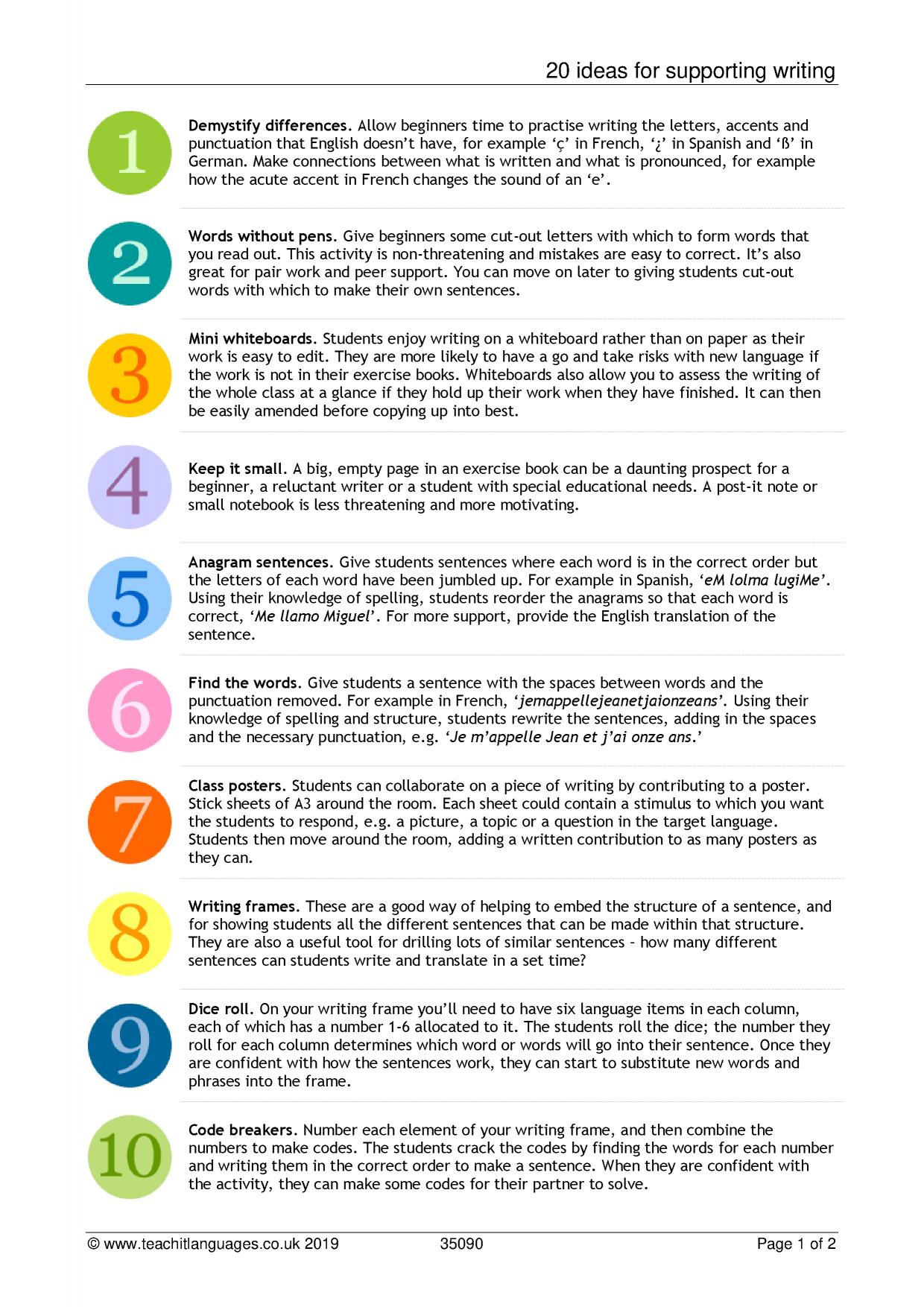


French Language Teaching Resources Teachit Languages Teachit Languages
To speak more generally, ce que/ce qui are used like que/qui, only when there is no expressed antecedent ;Can I come with you?The answer that you expect is "J'invite mon cousin" (= I invite my cousin) Here the answer that you expect is "mon cousin", which is the object of the sentence, so you have to use qui estce que (if the next word starts with a vowel "que" becomes "qu' ", but this DOES NOT happen to



Qu Est Ce Que Vous Aimez Faire J Adore Les Spectacles Pdf Free Download


Http Www Atarimania Com Documents Atari conversational french Pdf
For example Tu travailles / Estce que tu travailles?If you want to ask what something is by name, simply add the name of the thing after c'est quoi or qu'estce que c'est These are not the most elegant questions, but probably the most commonly used Qu 'estce que c'est que somethingCe que is like ce qui it stands for what but is used when it is the object of the clause For example What I like is Ce que j'aime c'est It is also used after tout, again when it is the object of the verb For example Everything that I do is excellent Tout ce que je fais est excellent It is used to mean which when it refers back to an idea, rather than a specific noun and it is


Http Motiverleseleves Weebly Com Uploads 1 4 8 6 Rules For 7 Familles Pdf



Final Exam 10 December 15 Questions And Answers Studocu
Translations in context of "est ce que" in FrenchEnglish from Reverso Context estce que je peux, estce que ça va, estce que cela, estce que tu vas, estce que tout Examples are used only to help you translate the word or expression searched in various contexts They are not selected or validated by us and can contain inappropriateBasic examples of French questions using the "estce que" method of translation Translate each sentence using estce que(What are you looking for?) French inversion questions are simply a more formal way to ask questions For example, you will hear a qu'estce que question in the French version of the silly, super casual Disney classic "Hakuna Matata," whereas this science explainer uses inversion questions Want even more examples of how French native speakers use questions in different contexts



5pzx9v9i3wdm


Core Ac Uk Download Pdf Pdf
Quand estce que tu y vas?All About Que Uses, Meanings, and Examples in French Share Flipboard Email Print Tom Merton/Caiaimage/Getty Images French Grammar Pronunciation & Conversation Ce que j'aime, c'est l'aventure What I love is adventure Indirect commands Que le bonheur vous sourie May happiness smile upon youExample Il ne sait pas ce qui s'est passé He doesn't know what happened Ce que is used for a direct object Example Il ne sait pas ce qu'il a fait He doesn't know what he's done Ce dont is used with verbs, adjectives and nouns that normally take the preposition de Example Il a raconté tout ce dont il se souvient



Please Provide The Answer To The Problems Below Type Full Sentences Example J Ai Trente Sept Brainly Com



Est Ce Que Question Type And Various Methods Youtube
Need to translate "QU'ESTCE QUE TU DIS" from french and use correctly in a sentence?Need to translate "QU'ESTCE QUE TU DIS" from french and use correctly in a sentence?1 Vous avez quel âge?



Dana The Petit Punks Music


Q Tbn And9gcrvxxfm H235j5g51d Kuiqxzhmwjtgrhsmquphvgw Rj Klnmn Usqp Cau
What did you say?Puorquoi estce que tu pleures?Estce que / Qu'estce que1)Je ne reconnais pas ce que tu me montres ___ c'est ?2)___ c'est déjà l'heure d'aller se coucher ?3)___ tu aimes la musique classique ou pas ?4)___ vous aimez le plus ?


2



Year 9 French Week 5 Lesson 1 Ask Questions In The Present Tense Youtube
How have you been?Contextual translation of "est ce que l'examen est facile" into English Human translations with examples is it that, what is emdr ?, • what is wipo?, the exam is easy(= Who is it that called?



How To Say Perfect In French Clozemaster


Link Springer Com Content Pdf 10 1007 2f978 1 349 5 12 Pdf
Usage notes Estce que is unique among French expressions in that it doesn't actually meanIn French they are words like que, qui, pourquoi or expressions like qu'estce que or qu'estce que c'est que Even when a question word indicates that a question is being asked, as for questions without question words, the principal indicator that shows that a question is being asked is a subject / verb inversionJe vais bien, merci I'm fine, thank you Je suis très heureux de vous rencontrer I am very glad to meet you J'ai été très heureux de faire votre connaissance It was nice meeting you Je ne comprends pas I don't understand Qu'avezvous dit?



Pdf Alors And Donc In Spoken French A Reanalysis


Q Tbn And9gcqkotukjqw Twuzitjefymwoffe3jnrdh4nt5g92z Yhiq4jn Usqp Cau
Qu'est ce que examples SuperAngebote für Ce Que Je Sais hier im Preisvergleich bei Preisde!Pourquoi estce que Sandy s'est sauvée?Le rock ou le jazz ?5)___ ils regardent les films en version originale ?6)___ elle reg
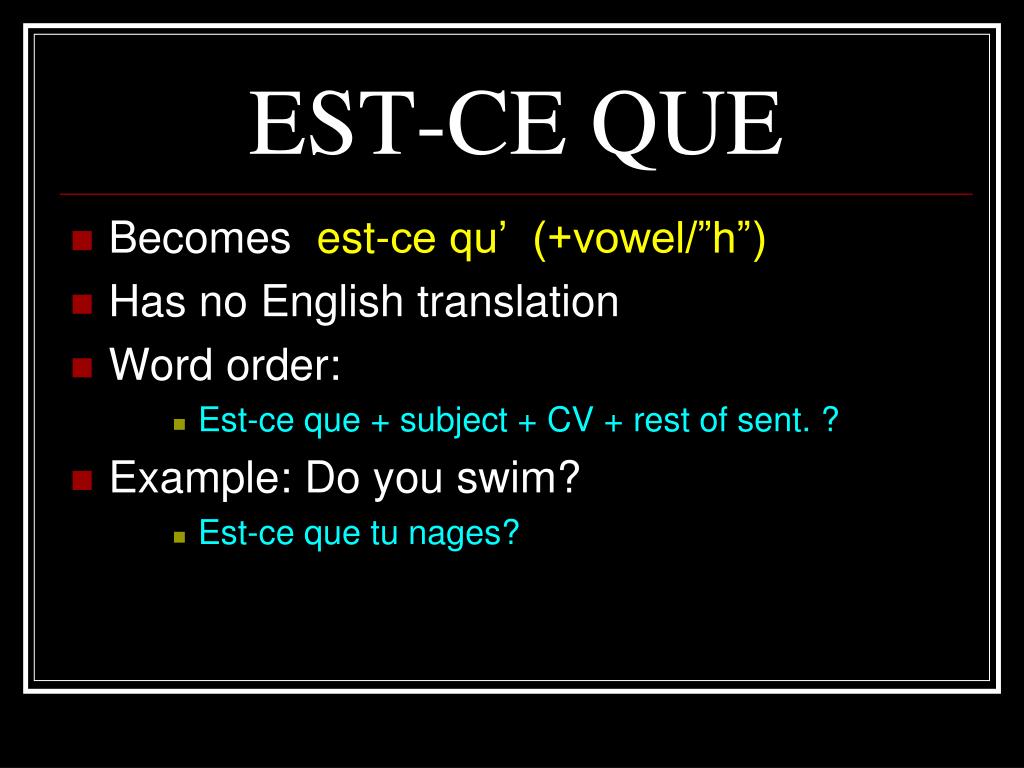


Ppt Les Questions Powerpoint Presentation Free Download Id



Ohlala French Course Facebook
Ce que tu achètes est intéressant What you're buying is interesting Ce que vs que Ce que is indefinite there is no antecedent Compare the above with these examples using the definite relative pronoun que Le thé que tu as mis dedans est vert The tea you put in it is green Le livre que tu achètes est intéressantCorey Oh, j'ai trouvé que l'examen était trop technique Moi, je suis plus romantique que scientifique Corey Oh, I thought that the exam was too technical I am more romantic than scientific 'estce' and 'y atil' The inverted forms of 'c'est' and 'il y a' are estce and y atil JoeBob Estce possible?Here are many translated example sentences containing "QU'ESTCE QUE TU DIS" frenchenglish translations and search engine for french translations



Qu Est Ce Que C Est Le Theme Examples Of Theme Anchor Charts Chart Theme



Intonation Questions Verb Subject Grammar
2 Estce que votre meilleur ami rêve de rencontrer l'âme sœur?How to use ce qui, ce que and ce dont in French We use the relative pronouns ce qui, ce que, and ce dont when the pronoun does not refer to a single word in the sentence, but rather to an entire clause Each form is used differently according to its function in the relative clause Ce qui is used for a grammatical subject Example Il ne sait pas ce qui s'est passéLiterally) Qui a appelé ?



Learn French Words With Free Audio Examples In Useful French Phrases How To Speak French Learn French



The Basics Of French Sentence Structure Word Order
You can also ask a yes or no question by beginning with "Estce que" and raising your voice at the end Estce que tu aimes la glace?Expr (Il pleut fort !) (rain informal) It's tipping down!, It's bucketing down!, It's pouring down!, It's chucking it down!Puorquoi estce que tu y vas?



Est Ce Que Questions French Quick Lesson Learn French Grammar Lessons Fun Lessons



14 Pronom Que Quel Ce Qui French Conjugation Noun
French exercise "Estce que / Qu'estce que" created by teinka with The test builder More lessons & exercises from teinka Click here to see the current stats of this French testBefore a vowel, estce que becomes estce qu' Example estce qu'elle estce qu'il In older forms of French, and in more formal registers of presentday French, the role of estce que is often fulfilled by subjectverb inversion Quand viendrezvous ?You can ask more openended questions with the phrase Qu'estce que Qu'estce que vous cherchez?


Secure Media Collegeboard Org Digitalservices Pdf Ap Apcentral Ap15 French Language Interpersonal Writing Pdf



Extra Notes Sentences Questions Ppt Download
In fact, estce que itself results from subjectverb inversion;When will you come?In fact, estce que itself results from subjectverb inversion;
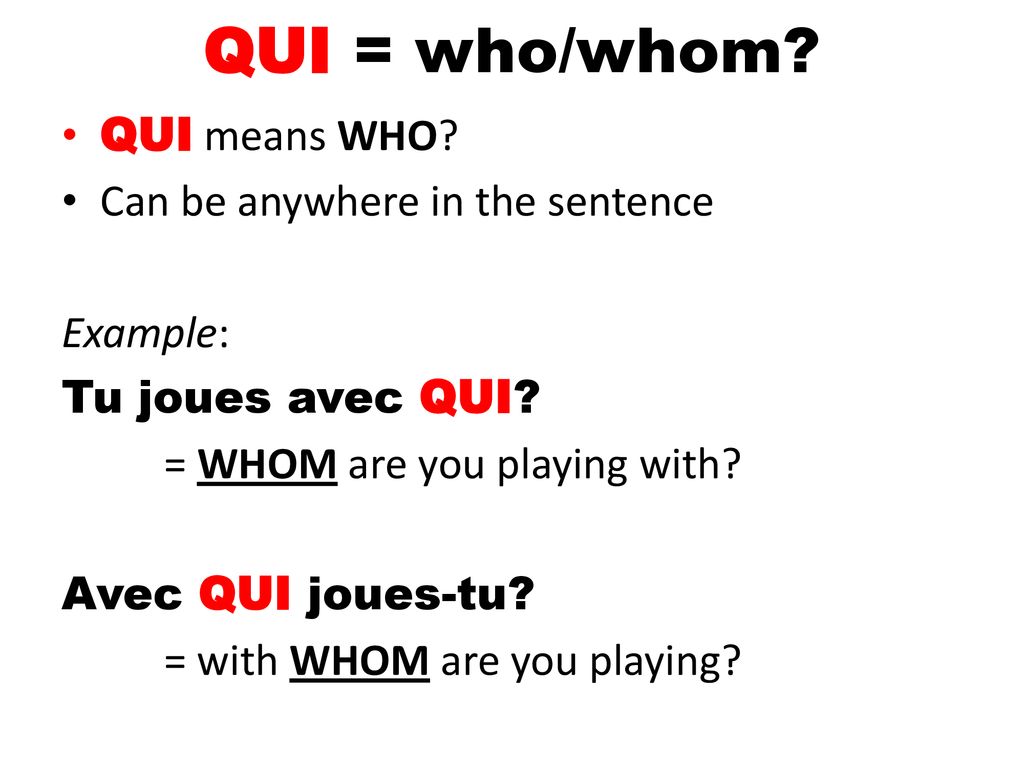


Qui Quoi Qu Est Ce Que Qu Est Ce Qui Ce Qui Ce Que Ppt Download



Amazon Com French English Dictionary Translator Free Appstore For Android
Paulette l'a trouvé / Estce que Paulette l'a trouvé?> You aren't hungry / Aren't you hungry?For example, Qu'estce que c'est?



Qu Est Ce Que Le Boltswitch Support


7th Day Of Studying French Studying Amino Amino
It comes from c'est queTu veux voir un film?INFINITIVES An infinitive is a verb that has not been conjugated



See Inside


2
You can ask more openended questions with the phrase Qu'estce que Qu'estce que vous cherchez?Vous n'avez pas faim / Estce que vous n'avez pas faim?Que est ce → "What is it/that?" As a French question, it's a longer way to ask "What ?" It's correct French, but in real, everyday spoken French, we tend to ask shorter questions For instance, you can ask Qu'estce que c'est ?
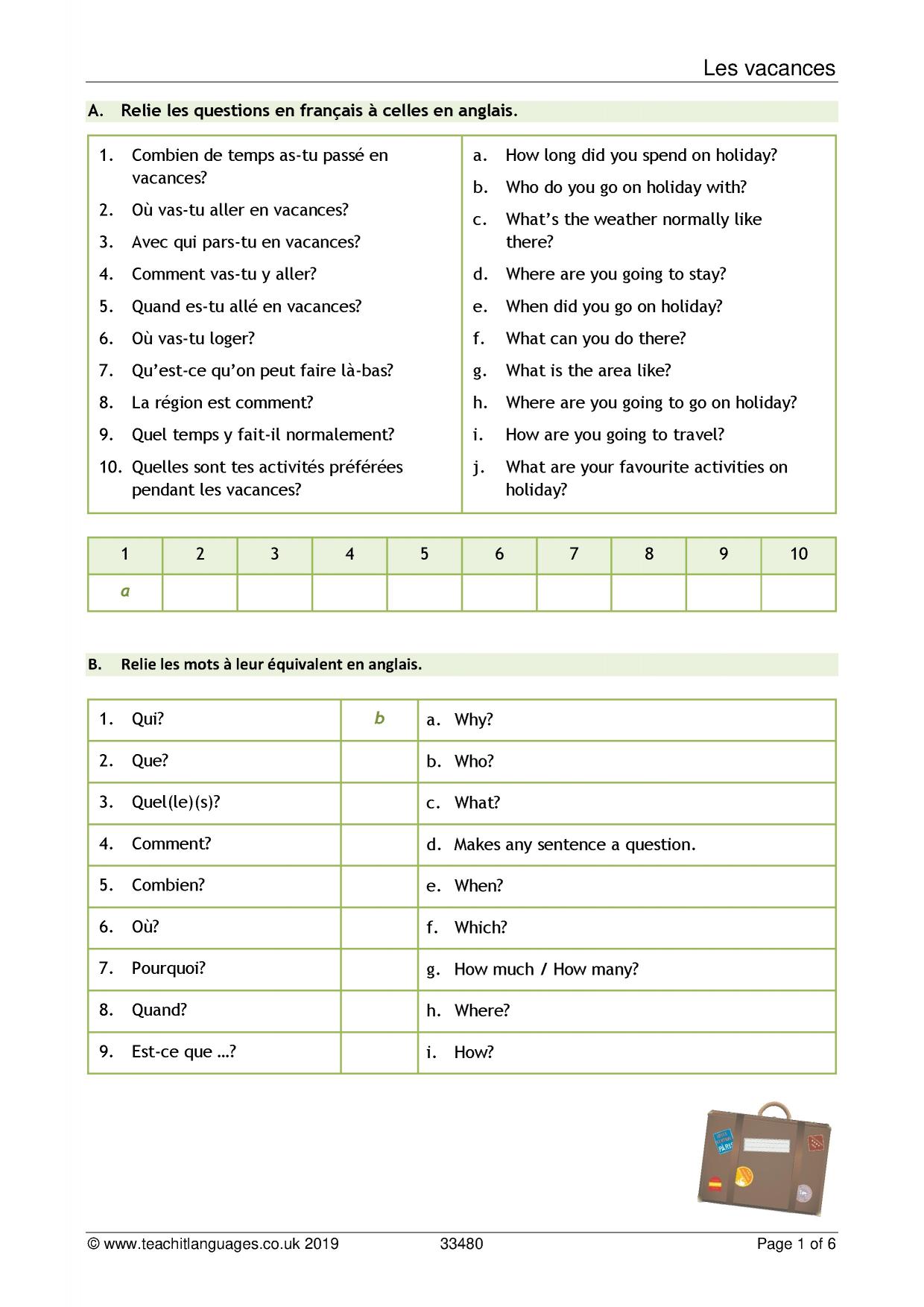


French Language Teaching Resources Teachit Languages Teachit Languages


2
Contextual translation of "est ce que tu parle francais" into English Human translations with examples do you, a little, yes, i do, do you know, do you laugh?In French, you can ask a question in a couple of different ways In English, when you ask a yes/no question in present tense, you typically begin with Do you, and the verb follows (For example, Do you have a cat?) French has two primary ways of asking the same question Add estce que at the beginning of a sentence4 Il y a des étudiants étrangers dans la classe, n'estce pas?



Metaprime Examples Qu Est Ce Que C Est Question


2
Translations in context of "Qu'estce que c'est" in FrenchEnglish from Reverso Context qu'est ce que c'est, qu'estce que c'est que ça, qu'estce que c'est gentil Examples are used only to help you translate the word or expression searched in various contexts They are not selected or validated by us and can contain inappropriate termsQuestions with estce que Questions with estce que are mostly used in spoken language After estce que, the sentence keeps its regular form (subject – verb – object) These kinds of questions can be constructed with or without question words without a question word;> You work / Do you work?
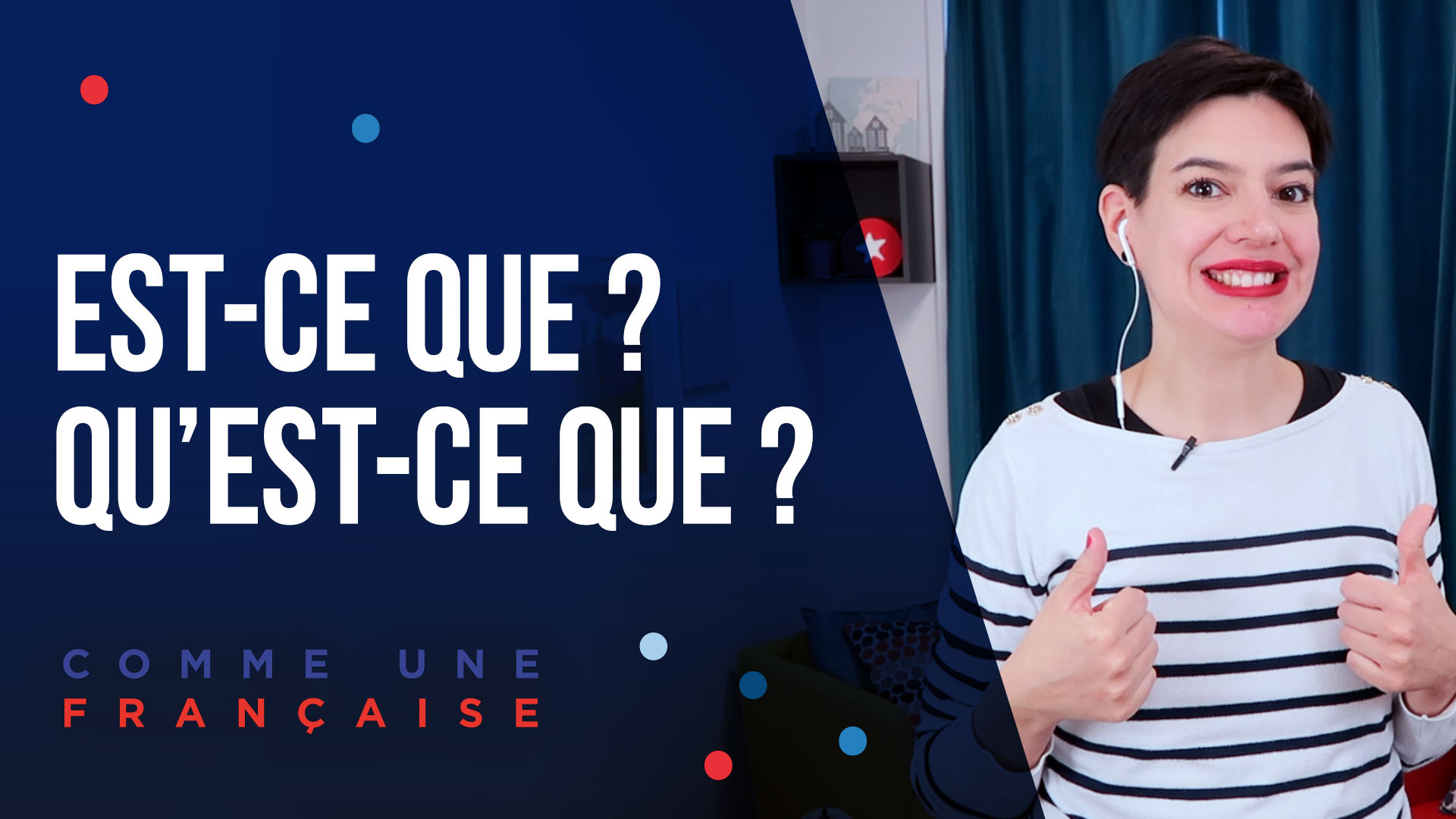


Asking Questions In French Est Ce Que Vs Qu Est Ce Que Comme Une Francaise



Learn French Blog By Frenchpod101 Com
For example, they're used to refer to an idea In your second example, the idea is "the ability to bear fruits" Then the choice between using que/ce que or qui/ce qui will depend on the grammatical function they occupy in the sentenceESTCE QUE You can make a sentence into a question just by raising the pitch of your voice at the end of the sentence Tu aimes la glace?Before a vowel, estce que becomes estce qu' Example estce qu'elle estce qu'il In older forms of French, and in more formal registers of presentday French, the role of estce que is often fulfilled by subjectverb inversion Quand viendrezvous ?



Pronoms Relatifs Ce Qui Ce Que Ppt Download



Ball Colloquial French Grammar A Practical Guide Pdf Document
It comes from c'est queWhen will you come?Questions with estce que Questions with estce que are mostly used in spoken language After estce que, the sentence keeps its regular form (subject – verb – object) These kinds of questions can be constructed with or without question words without a question word;
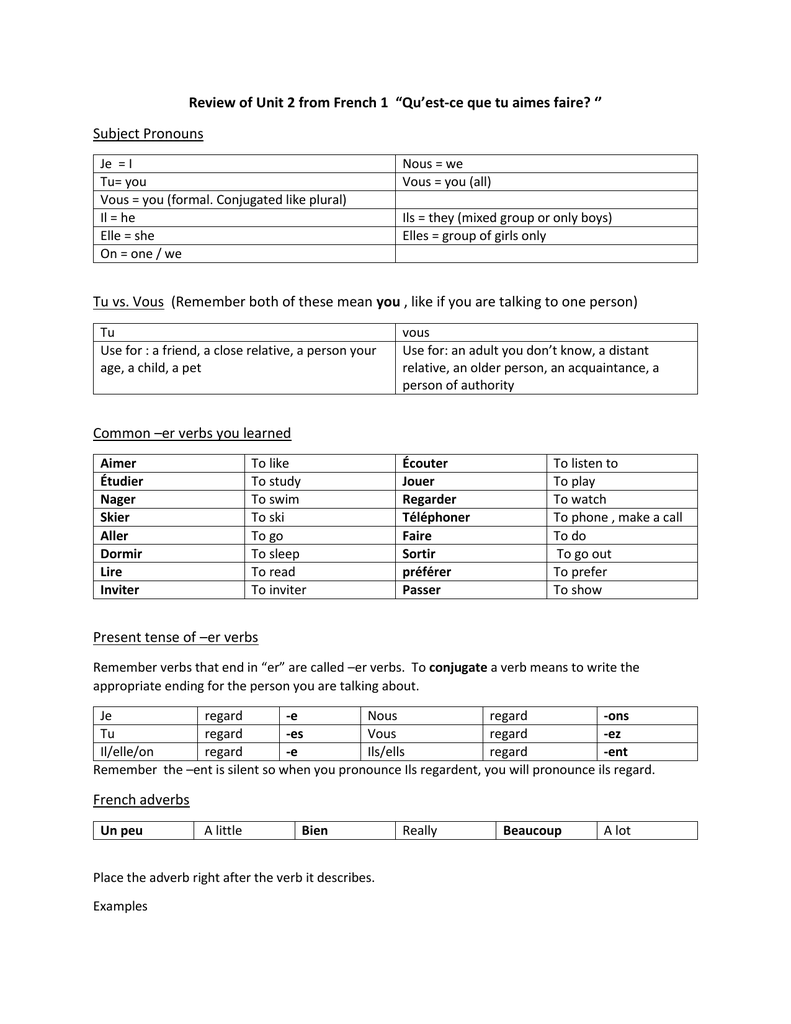


Review Of Unit 2 From French 1 Qu Est



French Finals Lecture Notes 4 Studocu
Questions with estce que Questions with estce que are mostly used in spoken language After estce que, the sentence keeps its regular form (subject – verb – object) These kinds of questions can be constructed with or without question words without a question word;Do you like the book?Contextual translation of "ou est ce que tu es" into English Human translations with examples do you, do you happy, are you tom?, are you sure?, do you laugh?



3 Ways To Ask Where In French Visual Ly


Http Www Thinklanguage Com French Sites Thinklanguage Com French Files Thinkfrench June14 Grammar Pdf
(Where do you want to go?) Asking "why" questions Asking "why" is one of the most important things you can ask The French translation is pourquoi Let's look at an example Pourquoi estce que vous mangez trop?A' quelle heure estce tu pars?(What are you looking for?) French inversion questions are simply a more formal way to ask questions For example, you will hear a qu'estce que question in the French version of the silly, super casual Disney classic "Hakuna Matata," whereas this science explainer uses inversion questions Want even more examples of how French native speakers use questions in different contexts



Asking Questions In French With Est Ce Que French Essentials Lesson 30 Youtube
/French_LIRE_conjugation-58a783633df78c345b116e9d.jpg)


Conjugate The French Irregular Verb Lire To Read
Can I come with you?It can be used to ask questions with either an inversion or estce que * Inversion = verb hyphen subject/pronoun astu Pourquoi astu fait cela?Example Estce que je peux venir avec toi ?



The Beginner S Guide To Mastering The French Present Tense Grammatical Conjugation Grammatical Tense


Www Laits Utexas Edu Tex Pdf Tac3 Pdf
The adverbs où, quand, comment, combien, pourquoi are able to accept the form estce que It's written that estce que is placed always after the interrogative adverbs And as examples Où estce que tu vas?Finally, we can simplify our question, eliminating the estce que and using the hyphen Où veuxtu aller?Before a vowel, estce que becomes estce qu' Example estce qu'elle estce qu'il In older forms of French, and in more formal registers of presentday French, the role of estce que is often fulfilled by subjectverb inversion Quand viendrezvous ?



French Hobbies Qu Est Ce Que Tu Aimes Faire Worksheets Hobbies Worksheets Told You So


Link Springer Com Content Pdf 10 1007 2f978 1 349 5 4 Pdf
Estce que tout va bien?> Paulette found it / Did Paulette find it?Are you going to go to the beach?



Demonstrative Adjectives And Pronouns Pdf Free Download


Easy French Step By Step Calameo Downloader
Example Estce que je peux venir avec toi ?Is there candy ?"Qu'estce que" is almost like saying "What do" "Estce que" is better known as "do" by itself (Not literally is it "Do", but it's better translated that way) To remove "estce que", generally you would switch the verb and the pronoun They are mainly used in questions



The Best French Translation Apps And Why You Can T Trust Them



I Love You In French And Other Romantic Phrases Lingvist
II USING ESTCE QUE Another simple way to ask a question in French is to add estce que in the beginning of a sentence Estce que literally means "is it that" in English, and is inserted before a regular statement to turn it into a question The rest of the sentence structure stays the sameExpression Prepositional phrase, adverbial phrase, or other phrase or expressionfor example, "behind the times," "on your own" Qu'estce que ça tombe !Ce que is indefinite there is no antecedent Compare the above with these examples using the definite relative pronoun que Le thé que tu as mis dedans est vert The tea you put in it is green Le livre que tu achètes est intéressant The book you're buying is interesting J'ai lu le message qu'elle a écrit
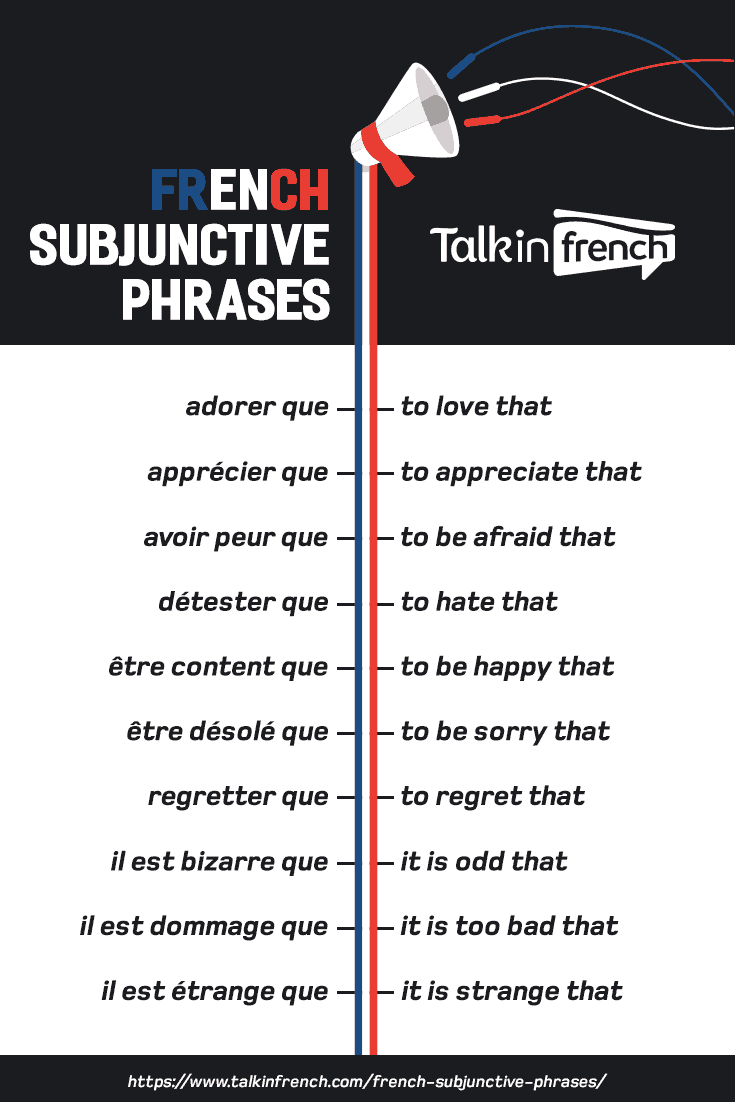


French Subjunctive Phrases List Of Words And Expressions Pdf
/GettyImages-162734872-57fad3773df78c690f77b4e5.jpg)


How To Use Est Ce Que To Ask Questions In French
It is just to add "Estce que" to the front of a statement With "Estce que" in front of it, any statement becomes a question Here again are the examples above, but this time instead of the English translation you'll find the French alternative using estce queParce qu'elle déteste les extraterrestres Parce qu'elle voulait suivre (follow) Morgan Parce qu'elle ne sait pas piloter Parce que Morgan a tiré sur l'ambassadeur des extraterrestresCan I come with you?


2


Macsphere Mcmaster Ca Bitstream 1 Fulltext Pdf
Que, quoi, quel(s), quelle(s) or qu'estce que (qui) ?Why did you do that?Qui estce qui, Qu'estce qui , Qui estce que Que and qui are unique in that they can act as the subject of a question When they act as an object within the sentence, continue to attach estce que, but when they act as a subject attach estce qui


Repository Upenn Edu Cgi Viewcontent Cgi Article 1694 Context Pwpl



Writing An Informal Letter Personal Writing French Vce Text Types Magic Language Method
Estce qu'il y a des bonbons ?A simple explanation of "Qu'estce qui verb = What does" Revise and improve your French with detailed content, examples, audio, personalised practice tests and learning toolsEstce que tu vas aller à la plage ?
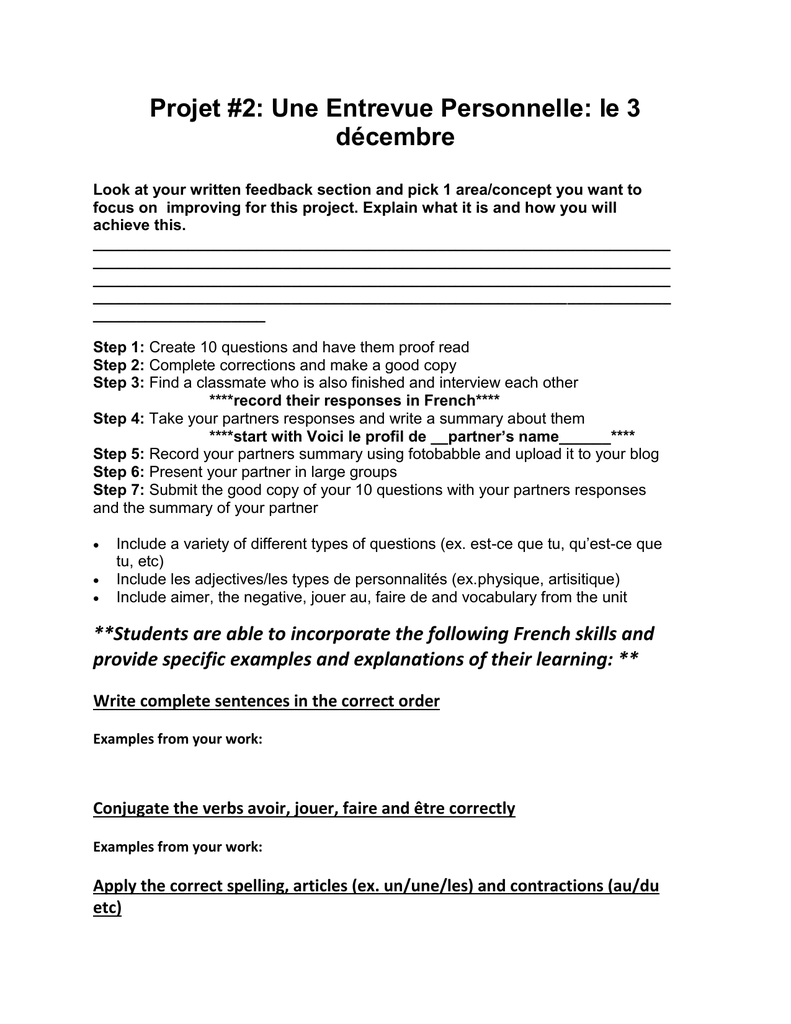


Une Entrevue Personnelle
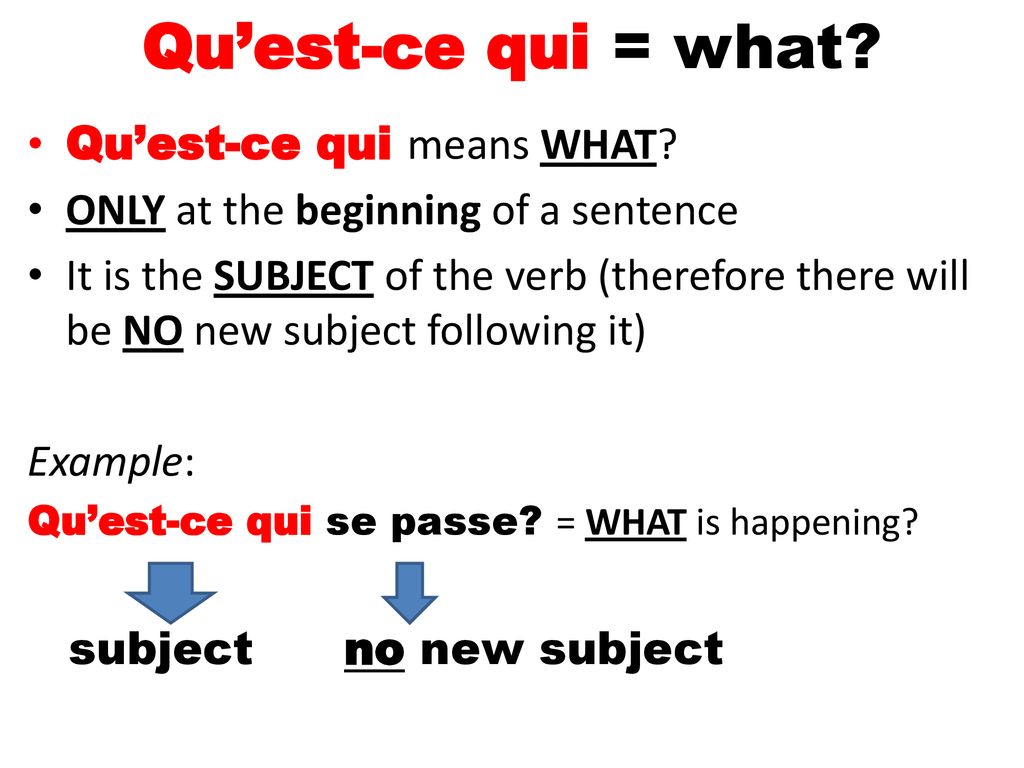


Qui Quoi Qu Est Ce Que Qu Est Ce Qui Ce Qui Ce Que Ppt Download
(Why do you eat too much?)A simple explanation of "Questions Qui, qui estce qui = Who ?" Revise and improve your French with detailed content, examples, audio, personalised practice tests and learning toolsFor example "Qui estce que tu invites?" = Who do you invite?



Understanding French Pronouns



Quiz Worksheet Interrogative Sentences In French Study Com
Qui estce qui, Qu'estce qui , Qui estce que Que and qui are unique in that they can act as the subject of a question When they act as an object within the sentence, continue to attach estce que, but when they act as a subject attach estce quiHere are many translated example sentences containing "QU'ESTCE QUE TU DIS" frenchenglish translations and search engine for french translationsLet's try to clarify When 'what' precedes a noun, you need to use the interrogative adjective quel or quelle (f) in front of the noun Quel(le) can be used with the inversion construction form or with estce que to make the question


The Lad Storyboard By Dean



Le Conditionnel The Conditional In French



Going Beyond The Sentence Contextual Machine Translation Of Dialogue Au Dela De La Phrase Traduction Automatique De Dialogue En Contexte Semantic Scholar



French Vocabulary Babbel


2



Question Formation In French Ppt Download
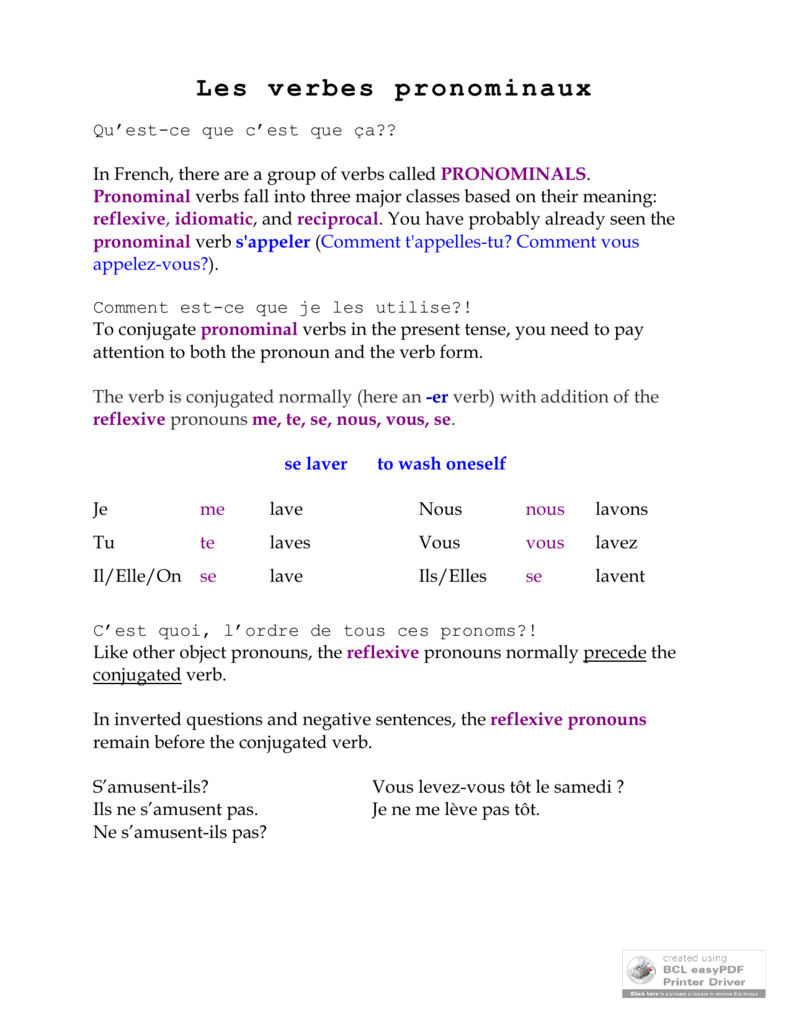


Les Verbes Pronominaux


1



L Interrogation Intonation Est Ce Que Inversion With Sentences Youtube


Q Tbn And9gcqwavjf1sg3iurej3qmabhrc57dck3s14maf6ftncw Usqp Cau
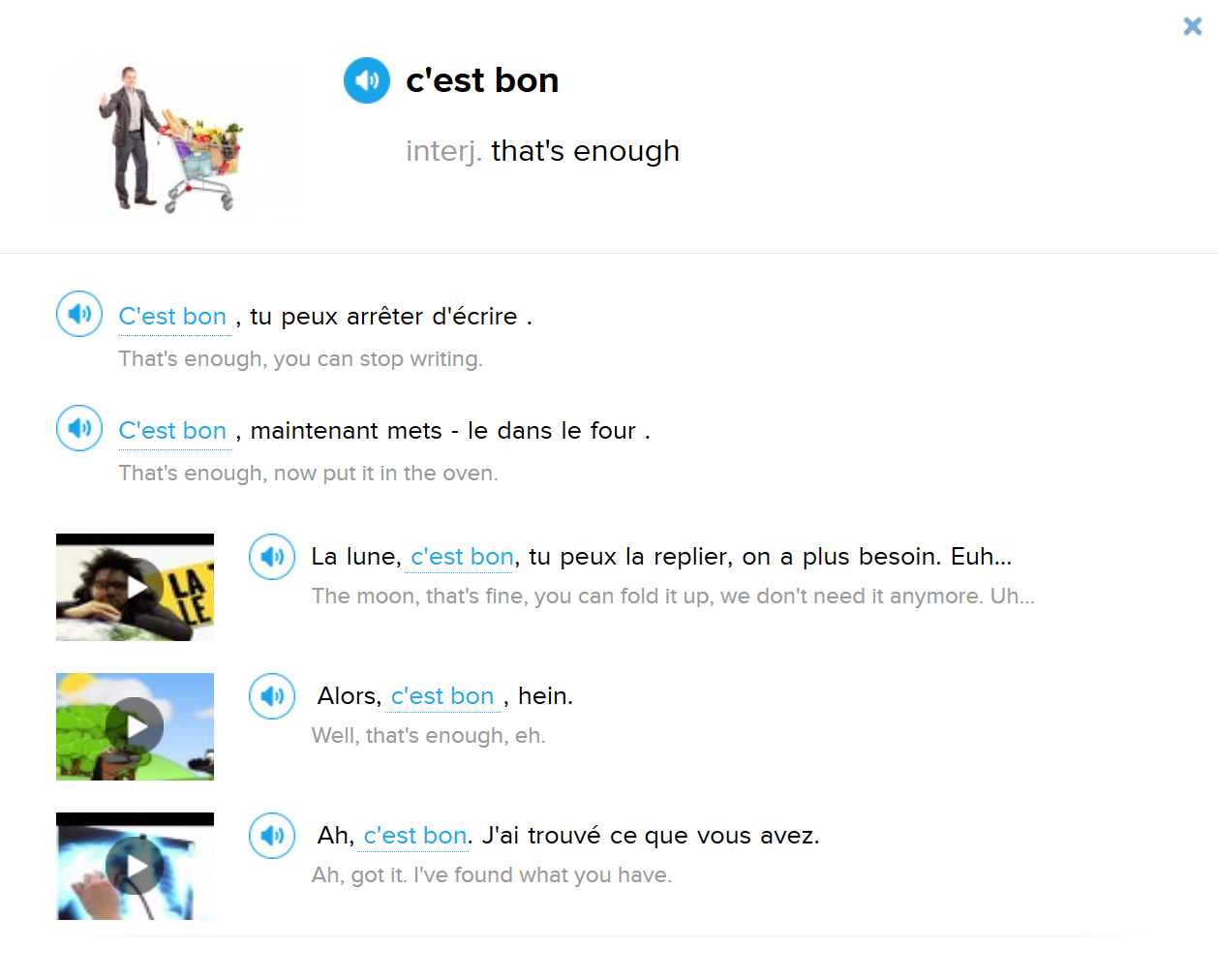


The Many Meanings Of C Est Bon The French Phrase That S Better Than Good


2



How To Improve Your Writing Skills With French Grammar Checkers



French Tv Viewing Habits Je Ne Le Rate Jamais I Never Miss It Teaching Resources



Teaching Foreign Languages In Schools The Silent Way By Educational Solutions Worldwide Inc Issuu



Pronoun Worksheets 4th Grade Reading Right Printable Worksheets And Activities For Teachers Parents Tutors And Homeschool Families


Http Www Pearsonschoolsandfecolleges Co Uk Assetslibrary Sectors Secondary Subject Modernlanguages Pdfs Ks3 Mfl Curriculum 14 Studio 1 Pp104 105 Pdf



Rn1uju Iptotom



Ppt Direct Object Pronouns Indirect Pronouns Pronouns Y Et En Powerpoint Presentation Id



Qui Quoi Comment The Curious World Of French Question Words


2
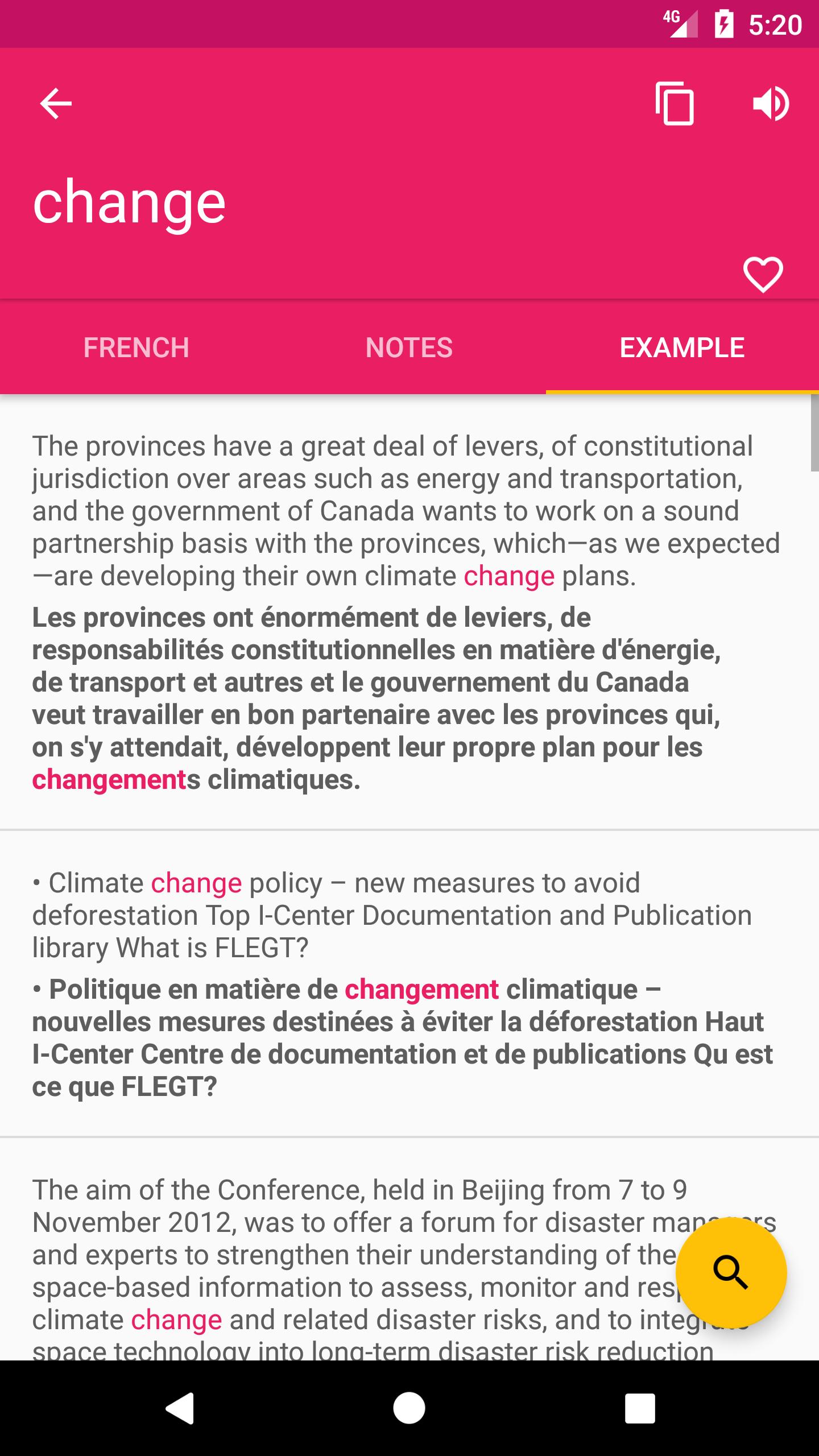


French English Offline Dictionary Translator For Android Apk Download
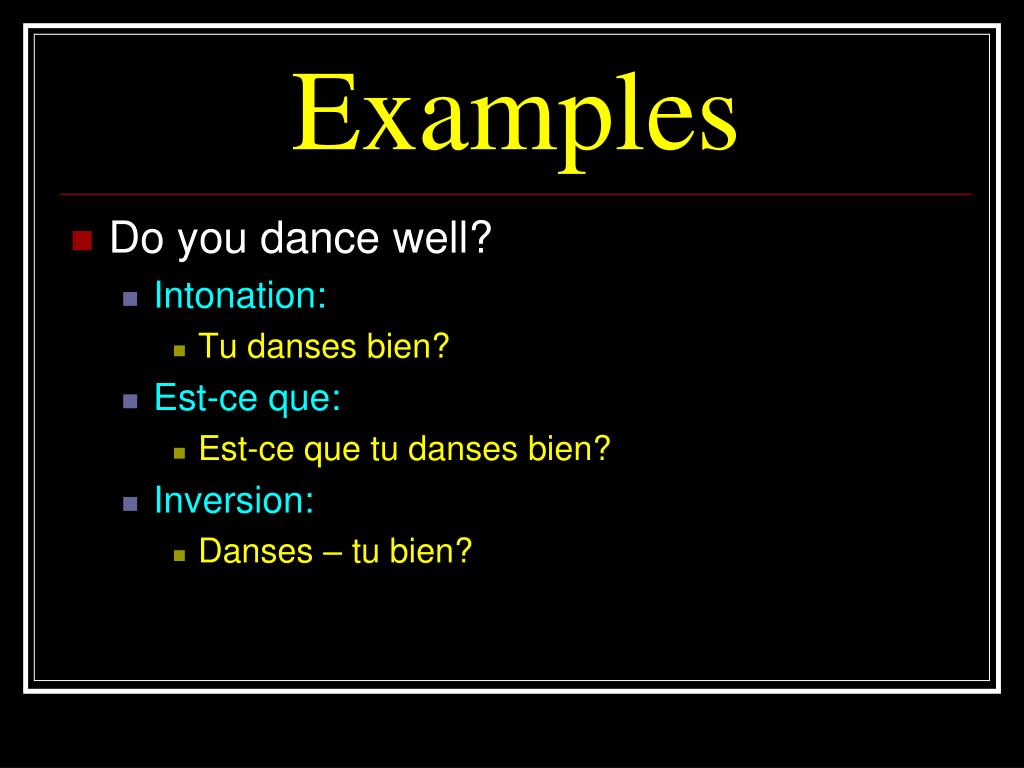


Ppt Les Questions Powerpoint Presentation Free Download Id


2



0 件のコメント:
コメントを投稿